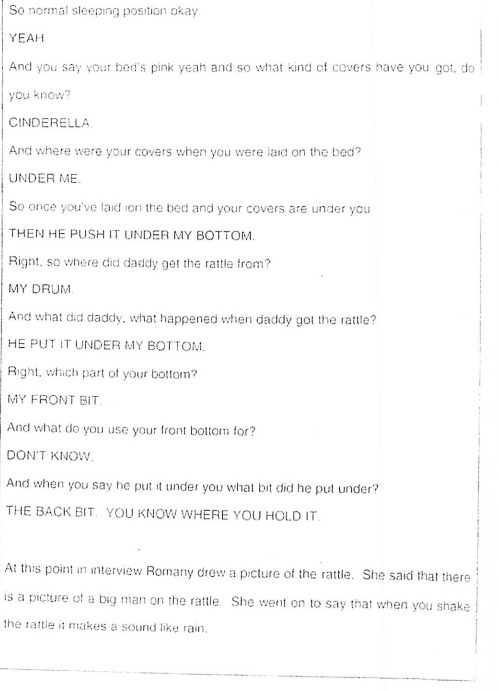
My latest guest on the podcast is Victoria Haigh.
More than ten years ago, her daughter disclosed sexual molestation by her father.
Victoria immediately took her to local police who interviewed her.
The forensic interview elicited another disclosure.
The police interviewed her ex-husband, but they did not charge him.
Victoria told me that she was told this would be better to be handled in family court, where the standard of proof was lower- the preponderance of the evidence (51% or more).
This turned into a nightmare.
This story is similar to many I have covered- check out Sunny Kelley’s- but there is one important difference.
Victoria was living in the UK.
Though there are some differences in the systems, both countries have shown that their court systems fail utterly in protecting children from abusive parents.
Victoria’s story is one of the most notorious.
Once in family court, the judge did not believe her; the police interviews never made it into the court records.
As such, even though police determined she was not coaching her daughter, the judge made that conclusion.
The judge even used the fact that her ex-husband was not charged against her.
There is one very important difference between British and American systems. While in the US, judges try to close courtrooms- arguing that their closure is in the child’s best interest- this is the standard in England.
I’ve been reporting on family courts for six years now – or trying to. It has been the hardest, most frustrating work I’ve ever attempted, because journalists are not actually allowed to report on what happens inside these courtrooms. This has to change, which is why I am launching the Open Justice Family Court Reporting Pilot, with the support of the Bureau.
Current UK law forbids anything that happens in a family court from being reported, unless a judge explicitly makes an order allowing it. Hundreds of thousands of people – parents, children, siblings, grandparents, adoptive parents, adopted children – are affected by the decisions made by family courts every year. And yet the process of arriving at decisions that utterly transform their futures happens effectively in secret.
Journalists do have the right to attend most family court hearings, but the media may not publish any of the details of what happens in front of the judge. If they do, they risk being held in contempt of court. Anonymising the details of a case does not protect the media from that risk, which can result in a fine or jail. This situation means media outlets simply do not send their reporters to these courts, and so there is very rarely anyone there to observe what is happening on the public’s behalf.
In England, before reporting on details of a case, the journalist, or anyone, must get the judge’s permission.
That’s exactly what happened- purportedly to rescue the reputation of her ex-husband from the false allegations. As such, Victoria was then smeared in the press- like in The Daily Mail.
David’s face suggests this is the most awkward thing you can ask someone in his situation.
‘Well, er, no. It’s difficult. Other parents don’t say “no” out of malice, but you get the “Oh sorry, she’s got to see her Granny” kind of thing.
‘I kind of don’t ask now. I don’t want to make people uncomfortable. I understand.’
He asks if, in the circumstances, I would let my daughter come for a sleepover at his house.
Oh my. In law, this is an innocent man. Three judges have said so.
Victoria received a “no molestation” order- the equivalent of a no contact order in the US- which she then violated when she saw her daughter at the gas station. For one interaction at the gas station with her daughter, Victoria was sentenced to three years in jail.
If the mother of a two-year-old child can be sent to prison solely on the basis of a supposed statement she is not allowed to see and which appears to have been concocted in very mysterious circumstances, we may wonder what passes for justice in the Britain of 2013. This is what has happened to Vicky Haigh, the former racehorse trainer, who for some years has been at the centre of one of the oddest cases of parents falling foul of our child-protection system that I have ever reported.
Last year Miss Haigh was sentenced to three years in prison – the longest such sentence ever recorded – for breach of a “non-molestation order” relating to her daughter by her former husband. Her offence had been to run into the girl at a petrol station. The girl had recently been taken from her care after a long case involving social workers, which ended with her ex-husband being given custody. Miss Haigh then won extensive coverage by fleeing to Ireland to prevent social workers seizing at birth the baby she now expected by the partner with whom she and her daughter had lived happily for six years, with Miss Haigh acting as stepmother to his three children.
Victoria now lives in France, with her younger daughter, who she delivered in Ireland because she feared authorities would take her as well, if she was in England.
To illustrate the severity of the problem in England, Victoria told me that she quickly supplied the contact information for over fifty other mothers with similar stories when asked by a journalist.
For more on the corruption in the British system, check out the interview Megan Fox and I had with Liz Perkins of the Daily Express. Starts thirty minutes in.















Share this post